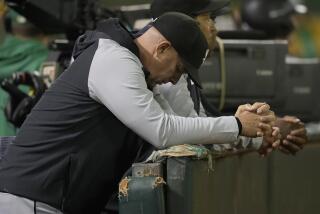The NHL / Julie Cart : Departures of Goring and Bowman: a Tale of 2 Coaches, Teams
- Share via
Two of the losingest teams in the Adams Division made coaching changes last week, but don’t look for drastic changes in their fortunes.
The Boston Bruins played the Buffalo Sabres last Wednesday night, and by the next morning both teams had new coaches.
Butch Goring, coach of the Bruins, was fired after Boston’s 8-3 loss to Buffalo. Scotty Bowman, who had been both coach and general manager for the Sabres, resigned as coach the day after the game.
Bowman’s departure as coach leaves only two other coaching general managers in the National Hockey League--Glen Sather at Edmonton and Bob Pulford at Chicago.
Bowman, who named his assistant, Craig Ramsay, as coach, will continue as general manager and director of hockey operations for the Sabres. Bowman has two years left, at $300,000 a year, on his general manager’s contract.
The Bruins are still casting about for a coach. General Manager Harry Sinden named former players Terry O’Reilly, who has been a broadcaster this season, and Mike Milbury, who was an assistant, as interim coaches.
A name being thrown out for the job is Terry Crisp’s. As general manager and coach of the Moncton Golden Flames of the American Hockey League, Crisp is paid by Calgary, which co-shares the team with Boston.
For Buffalo, it means the loss of the winningest coach in the NHL. Bowman leaves a 739-327-210 record. He also leaves an aging and struggling team.
The team’s leading scorers are Wilf Paiement and Gil Perreault. Perreault, 36, came out of retirement to play with the team this season, and Paiement is 31. Even though the Sabres picked up talented Clark Gillies on waivers this season, Gillies is 32 and can’t help the team for many more years.
Poor drafting brought Buffalo down. The Sabres had six first-round picks in 1982 and 1983, which should have assured them a bright future. Instead, four of the players are no longer with the team.
The Bruins have fared a little better, rising to a tie for third in the Adams Division. Goring, a former King, had an almost impossible task: to improve a team racked by injury and presided over by a demanding general manager. This is the eighth coaching change since Sinden took over in 1972 and the third since 1980.
It is believed by many that Sinden pressured Goring into carrying three goaltenders, which, as the Kings well know, is a difficult situation.
Under Goring, the Bruins finished third in the Adams Division last season but lost in the first round of the playoffs to Montreal, which went on to win the Stanley Cup.
Goring was able to establish a work ethic on the team and stem some of the constant griping. His absence seems likely to change that.
Investments he made as a young man are earning big dividends for Jimmy Devellano, general manager of the Detroit Red Wings. They may also be putting him into a conflict of interest.
Devellano used to roam the league as a scout for the St. Louis Blues and the New York Islanders. A decade ago, he had the opportunity to buy stock in Maple Leaf Gardens, Ltd., for $21 a share.
Devellano bought a few shares, and over the years he has added more as he has been able to afford it. Now he owns 5,100 shares, which amounts to an $861,900 investment in a rival NHL team. The Toronto Maple Leafs are owned by Harold Ballard.
John Ziegler, president of the NHL, does not think there is a conflict, yet. Or does he? “You have to concern yourself only when it gets to a situation of conflict of interest,” Ziegler said.
Ziegler said a possible conflict could only be determined by an investigation by the league. When asked if such an investigation is being undertaken in Devellano’s case, Ziegler said: “That’s not something we discuss publicly.”
So, for the moment, Devellano retains his stock and says he doesn’t understand what all the fuss is about. His shares amount to less than 1% of the 735,580 outstanding shares in Maple Leaf Gardens.
“I don’t intend to resign, and why should I sell my stock?” Devellano said. “It’s done very well. It’s not my fault it keeps going up. The way I look at it is this: I own less than 1%. I don’t attend (NHL) board of governor meetings and I don’t attend shareholder meetings. I have no say in how Maple Leaf Gardens is run.”
Phil Esposito, general manager of the New York Rangers, on what he would have paid Phil Esposito, the player, in his prime: “I’d probably give him 2 million a year and a couple of million besides.”
Esposito said that players today are different but not better than when he played in the 1960s and ‘70s. “The guys are bigger, stronger, shoot better and have better equipment now,” he said. “They skate better, so obviously they should be better.
“But there are three areas where I don’t think they are: They don’t think as well as we thought, they don’t check as well as we checked and the goaltending isn’t as good as we had.”
More to Read
Go beyond the scoreboard
Get the latest on L.A.'s teams in the daily Sports Report newsletter.
You may occasionally receive promotional content from the Los Angeles Times.







